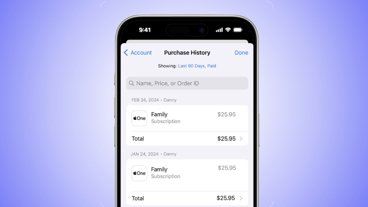Apple appears to have finalized the details of its settlement agreement for a class action suit over in-app purchases on iPhones and iPads, with the Cupertino company offering millions of dollars in refunds and iTunes credits.
A home page for the settlement program went live recently, laying out the options available for claimants in the class action suit over Apple's in-app purchase policies. That suit, filed in 2011, alleged that Apple's structure for processing in-app purchases was insufficient to stop minors from charging tens, hundreds, and sometimes thousands of dollars to their parents' accounts without permission.
Under the settlement agreement, Apple will provide a single $5 iTunes Store credit to claimants in the suit or a credit "equal to the total amount of Game Currency that a minor charged to your iTunes account without your knowledge or permission within a single forty-five day period." For claimants that no longer have an active iTunes account, a cash refund is available, as is the case for those whose claims exceed $30 in total.
All United States residents are eligible for an award from the settlement, provided that, prior to May 2, 2013, they paid for an in-app purchase in a qualified app. The purchase must have been charged to their iTunes account by a minor without their knowledge or permission. The deadline to submit a claim is January 13, 2014, and the deadline to object to or opt out of the settlement is August 30, 2013.
In-app purchases stepped into the spotlight over the last few years as developers looked for a way to further monetize their apps. As the option became more popular, complaints arose that it was too easy for children to rack up sizable charges on their parents' accounts.
Apple already had some protections in place to stop minors from abusing in-app purchases, but the company was forced by the attention from several cases to modify its iTunes Store listings in order to warn users which apps featured additional paid content. The company has since stepped up its educational efforts in order to bring parents up to speed on what they can do to head off unwanted expenditures.
 Kevin Bostic
Kevin Bostic







-m.jpg)






 Charles Martin
Charles Martin
 Christine McKee
Christine McKee
 Wesley Hilliard
Wesley Hilliard
 Malcolm Owen
Malcolm Owen
 Andrew Orr
Andrew Orr
 William Gallagher
William Gallagher
 Sponsored Content
Sponsored Content








28 Comments
Idiot parents are idiots. I honestly feel no sympathy for these people.
Fandroids are having a blast talking about this. Stupid parents make a mistake and Apple is responsible. Meanwhile, when Android users get malware it's the users fault for being so stupid to get themselves infected. Oh the irony.
I agree...my kids use my phone all the time and have never charged anything because they'd need to know the password, which they don't. If parents don't protect their devices, that's their own fault. It's a shame companies have to pay people who don't deserve to be paid.
$1.99 to remove ads? I buy that.
There is no substitute for good parenting. I have 3 kids ages 10, 9 and 9. They have always had access to my account (we use 1 account as a family) and have always known the password. My wife and I taught them at an early age that they need to ask permission to download anything even if it is free. We turned off in app purchases on their devices just to be safe. We also educated them on in app purchases as they often use our devices which do not have the in app purchases turned off. It is not that difficult to be involved parents.